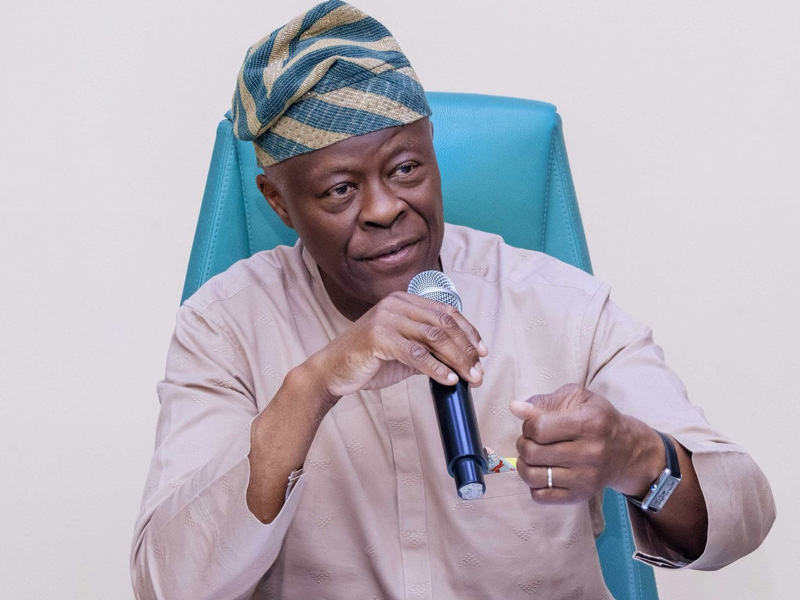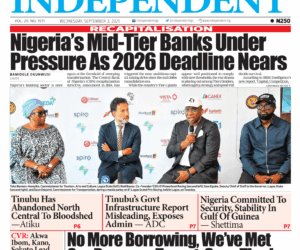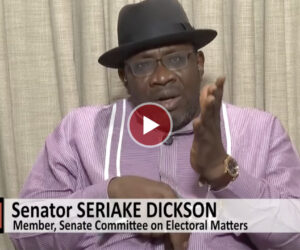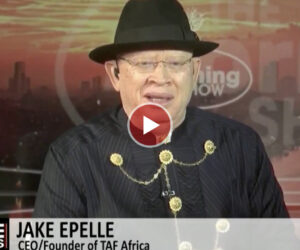The Consumer Price Index (CPI), which measures the rate of change in prices of goods and services, dropped to 20.12 per cent in August, compared to 21.88 per cent in the preceding month, National Bureau of Statistics (NBS) said on Monday.
The fall came on the day Minister of Finance and Coordinating Minister of the Economy, Mr. Wale Edun, ordered the immediate suspension of the collection of four per cent Free on Board (FOB) charge recently levied by the Nigeria Customs Service on all imported goods.
Edun conveyed the suspension in a letter dated September 15, 2025, which was signed by Permanent Secretary, Special Duties, Federal Ministry of Finance, R. O. Omachi, and addressed to the Comptroller-General of Customs.
The minister stated that the decision was taken following extensive consultation with industry stakeholders, trade experts, and relevant government officials.
He said it was clear that the implementation of the FOB charge posed significant challenges to trade facilitation, environment and economic stability.
Edun pointed out that many importers and businesses had raised concerns about the increased financial burden the levy imposed, with potential adverse effects on inflation, trade competitiveness, and the overall business climate in the country.
While urging strict compliance with the directive, the correspondence said the suspension of the charge will provide an opportunity for comprehensive stakeholder engagement and a thorough review of the levy’s framework and its broader economic implications.
“The ministry of finance looks forward to working closely with the service and all relevant parties to devise a more equitable and efficient revenue structure that supports both revenue generation and economic growth and stability,” the letter added.
Meanwhile, year-on-year, headline inflation stood at 12.03 per cent, lower than 32.15 per cent in August 2024.
NBS attributed the 1.76 per cent drop in inflation to moderation in food and energy prices in the review month.
According to the CPI Report for the month under review, inflation decreased in August compared to the same month in the preceding year, albeit, after rebasing.
Month-on-month, headline inflation stood at 0.74 per cent, lower than 1.99 per cent in July.
Food inflation dropped to 21.87per cent, year-on-year, in August compared to 37.52 per cent in the corresponding period of 2024.
NBS explained that the significant decline in annual food inflation was technically due to the change in the base year.
Nonetheless, the food index dropped to 1.65 per cent month-on-month in August compared to 3.12 per cent in July.
The statistical agency further attributed the decrease to reduction in average prices of imported and local rice, guinea corn flour, maize flour sold loose, guinea corn (sorghum), millet, semolina, soya milk, among others.
Similarly, the average annual rate of food inflation for the 12 months ending August 2025 over the previous 12-month average was 25.75 per cent, compared to 36.99 per cent in August 2024.
Core inflation, which excludes the prices of volatile agricultural produces and energy, dropped to 20.33 per cent, year-on-year, in August, a decline of 7.25 per cent compared to 27.58 per cent recorded in August 2024.
Month-on-month, the core index, however, rose to 1.43 per cent, compared to July 0.97 per cent in July.
The average 12-month annual inflation rate was 23.04 per cent for the 12 months ending August 2025. This was 2.14 per cent lower than the 25.18 per cent recorded in August 2024, according NBS.
Year-on-year, in August, urban inflation stood at 19.75.per cent compared to 34.58 per cent in August 2024. Month-on-month, urban index stood at 0.49 per cent, in compared to 1.86 per cent in July.
Equally, rural inflation rate dropped to 20.28 per cent year-on-year, compared to 29.95 per cent in August 2024.
Month-on-month, rural inflation was 1.38 per cent, compared to 2.30 per cent in July.
At the state level, year-on-year, headline inflation was highest in Ekiti (28.17 per cent), Kano (27.27 per cent), and Oyo (26.58 per cent), while Zamfara (11.82 per cent), Anambra (14.16 per cent), and Enugu (14.20 per cent) recorded the lowest rise in prices.
Month-on-month, however, the highest increases were recorded in Yobe (9.20 per cent), Katsina (8.59 per cent), and Sokoto (6.57 per cent), while Enugu (-5.32 per cent), Taraba (-3.64 per cent), and Nasarawa (-3.56 per cent) recorded decline in inflation.
Likewise, at the sub-national level, food inflation, year-on-year, was highest in Borno (36.67 per cent), Kano (30.44 per cent), and Akwa Ibom (29.85 per cent), while Zamfara (3.30 per cent), Yobe (3.60 per cent), and Sokoto (6.34 per cent) recorded the slowest rise.
Month-on-month, food inflation was highest in Kaduna (9.37 per cent, Katsina (9.05 per cent), and Akwa Ibom (7.87 per cent), while Bayelsa (-9.52 per cent), Sokoto (-8.92 per cent), and Borno (-8.74 per cent) recorded decline in food inflation.
In directing the suspension of the FOB, the minister said the order was pursuant to the powers vested on him under Part III, Section 12 of the Nigeria Customs Service Act, 2023 as Chairman of the Board of Nigeria Customs Services.
He said, “I write to direct the immediate suspension of the implementation of the collection of four per cent Free on Board (FOB) recently levied by the Nigeria Customs Service on all imported goods.”
On February 11, following pushback from stakeholders, NCS announced the suspension of the implementation of four per cent Free-on-Board (FOB) value on imports as provided in Section 18(1)(a) of the Nigeria Customs Service (NCSA) 2023.
In a statement issued by Assistant Comptroller of Customs, National Public Relations Officer (PRO), Abdullahi Maiwada, customs explained that the suspension followed ongoing consultations with Minister of Finance and Coordinating Minister of the Economy, and other stakeholders.
The statement said the suspension period would allow the service to further engage with stakeholders while ensuring proper alignment with the Act’s provisions for sustainable funding of these modernisation initiatives.
Maiwada said that would also enable comprehensive stakeholder engagement and consultations on the NCSA implementation framework. He added that the timing of the suspension aligned with the exit of the contract agreement with the service providers, including Webb Fontaine, which were previously funded through the one per cent Comprehensive Import Supervision Scheme (CISS). This, he said, presented an opportunity to review customs revenue framework holistically.
Under the previous funding arrangement repealed by the NCSA 2023, separating the one per cent CISS and seven per cent cost of collection created operational inefficiencies and funding gaps in customs modernisation efforts, the statement said.
Maiwada said, “The new Act addresses these challenges by consolidating ‘not less than four per cent of the Free-on-Board value of imports’, designed to ensure sustainable funding for critical customs operations and modernisation initiatives.
“This transition period will allow the service to optimise the management of these frameworks to serve our stakeholders and the nation’s interests better.”
However, the latest directive appeared to have put paid to implementation of FOB on imports.
James Emejo
Follow us on:








